Current News
/ArcaMax
Feds search Kentucky estate owned by SoHo crypto torture suspects
A Kentucky estate owned by two men accused of torturing an Italian man in SoHo over a Bitcoin password was raided by a team of investigators Tuesday.
New York City cops joined federal officials and Kentucky State Police to go through a property belonging to cryptocurrency investor John Woeltz and his associate William Duplessie, according to ...Read more

Trump says FEMA phaseout to begin after hurricane season
President Donald Trump said his team will move forward with winding down much of the Federal Emergency Management Agency — but not until after a hurricane season that some projections show could be particularly deadly.
“We’re going to do it much differently,” Trump said Tuesday at the White House, adding that he would like to see FEMA ...Read more
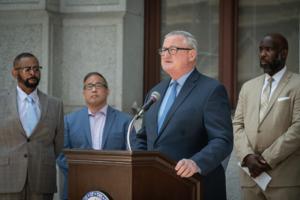
Former Philadelphia Mayor Jim Kenney: Sanctuary cities are 'common sense'
PHILADELPHIA — Former Philadelphia Mayor Jim Kenney called the city’s sanctuary city policy a “pragmatic” and “common-sense” solution to a broken immigration system that he said is now being “weaponized” by President Donald Trump.
“In the absence of much-needed federal immigration reform, mayors and governors are forced to ...Read more

Police officer injured, several anti-ICE protesters arrested during scuffle in Center City
A Philadelphia police officer was injured and several protesters were arrested after a scuffle broke out during a march denouncing deportations Tuesday evening in Center City, police said.
Video showed a confrontation at the intersection of 11th and Market Streets with police arresting at least one masked man, who was held down on the ground, ...Read more
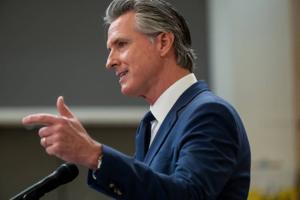
Newsom, in California address, says Trump purposely 'fanned the flames' of LA protests
Gov. Gavin Newsom on Tuesday night accused President Trump of intentionally fanning the flames of the Los Angeles protests and "pulling a military dragnet across" the city endangering peaceful protesters and targeting hardworking immigrant families.
The Democratic governor's comments were a forceful rebuke to the president's claims that ...Read more
Connecticut high school students rally to protest classmate's ICE detention
High school students in Meriden, Connecticut, are rallying in support of a classmate who was snatched by Immigration and Customs Enforcement, along with his father, days before graduation.
Students and state officials were outraged the teen would be cooped up in a Texas ICE detention center instead of onstage receiving his diploma in person at ...Read more

Coast Guard suspends search for 6 onboard plane that crashed into sea
SAN DIEGO — The search for survivors from a downed Cessna plane that crashed into the ocean Sunday was suspended Tuesday morning after personnel used aircraft and boats to scour 300 square miles of ocean.
“They are still unaccounted for,” a Coast Guard spokesperson said of the six victims presumed to have died.
The search began Sunday ...Read more
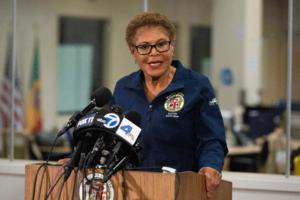
Mayor Bass enacts curfew for parts of downtown LA to stem chaotic protests
LOS ANGELES — Mayor Karen Bass has announced a curfew will be put into effect for one square mile of downtown Los Angeles following four nights of sporadically chaotic protests during which the LAPD arrested more than 150 people.
The curfew will extend from 8 p.m. to 6 a.m. It will apply to the area of downtown from the 5 Freeway to the 110 ...Read more

Trump tariffs can remain in effect, US appeals court says
WASHINGTON — Donald Trump can continue to enforce his global tariffs for now, a federal appeals court held in a win for the president on one of his signature economic policies.
The order Tuesday by the U.S. Court of Appeals for the Federal Circuit extends an earlier, short-term reprieve for the administration as it presses a challenge to a ...Read more

Why was Las Vegas on Trump's 'sanctuary' list? Officials don't know
LAS VEGAS — Nearly two weeks after the U.S. Department of Homeland Security designated the city of Las Vegas as a “sanctuary” for undocumented immigrants, which threatens withholding of federal funds, local officials haven’t been told why.
The DHS list of hundreds of jurisdictions, which it alleges flout federal immigration laws, ...Read more
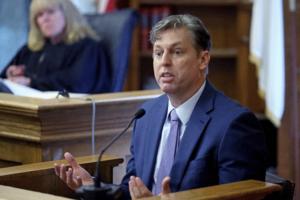
Karen Read retrial: Experts say wounds don't suggest vehicle strike
DEDHAM, Mass. — Two expert witnesses for murder defendant Karen Read said that although victim John O’Keefe experienced major head trauma, the absence of other significant injuries made it unlikely a vehicle strike killed him — potent testimony in a trial the judge said is “winding down.”
“When you look at the position and ...Read more
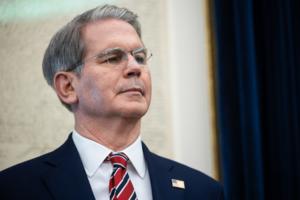
US, China officials agree on plan to ramp down trade tensions
The United States and China de-escalated trade tensions, agreeing to a preliminary deal on how to implement the consensus the two sides reached in Geneva, negotiators for both sides said.
While the full details of their accord weren’t immediately available, U.S. negotiators said they “absolutely expect” that issues around shipments of ...Read more
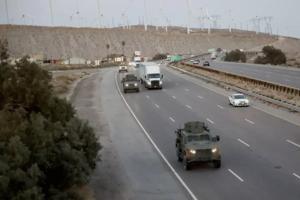
Marines on streets of LA bring peril, questions
LOS ANGELES — After days of fiery protest against federal immigration raids, Los Angeles residents and officials braced for the arrival of hundreds of U.S. Marines on Tuesday in what some called an unprecedented and potentially explosive deployment of active-duty troops with hazy mission objectives.
As Trump administration officials vowed to ...Read more
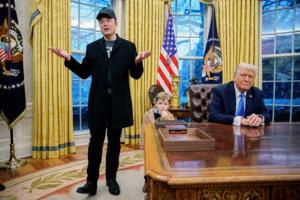
Is Elon Musk right to oppose the budget bill? What Americans said in a new poll
During his public falling out with President Donald Trump, Elon Musk slammed the president’s proposed spending bill — dubbed the “One Big Beautiful Bill” — claiming it will balloon the deficit.
It turns out, most Americans agree with his critique, new polling reveals.
In the latest Economist/YouGov poll, half of respondents were ...Read more
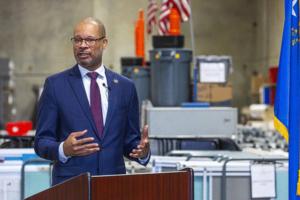
Nevada AG Ford joins lawsuit over Trump administration OK of firearm enhancement
Nevada Attorney General Aaron Ford announced this week he is joining a coalition of 15 other Democratic attorneys general in a lawsuit against the Trump administration to stop the redistribution of devices that the lawsuit claims enable firearms to fire like machine guns.
The Democrat’s latest lawsuit particularly targets the Bureau of ...Read more

Trump warns protesters at weekend military parade will face 'big force'
President Donald Trump on Tuesday warned protesters to stay away from his controversial military parade planned for Saturday in Washington D.C. — or face “very big force.”
As he defends his crackdown on immigration protests in Los Angeles, Trump said authorities wouldn’t hesitate to flex their muscles if protesters seek to disrupt the ...Read more
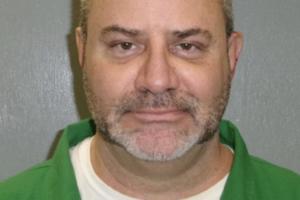
South Carolina firing squad 'intended to miss,' cause inmate 'extreme suffering,' lawsuit says
COLUMBIA, S.C. — When the three executioners fired their high-powered rifles at him, Mikal Mahdi, who was sentenced to death for the execution-style murder of an Orangeburg police officer, yelled. Over the next 80 seconds he moaned twice more before drawing his final, gasping breath.
Protocol required the executioners to aim for Mahdi’s ...Read more

Undocumented mother faces deportation after Pa. officials turn her over to ICE. Montgomery County policy likely to be reviewed
PHILADELPHIA — In a different jurisdiction, Andrea Lozano-Alanis could have been freed from jail as soon as she paid her $77 bail.
But she was in Montgomery County.
And that Philadelphia suburb holds immigrants wanted by ICE for an additional four hours, allowing time for federal agents to arrive and take them into custody.
That’s what ...Read more
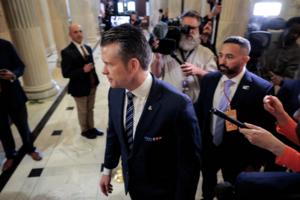
Democrats clash with Hegseth over Guard deployment, shipbuilding
WASHINGTON — House Democratic appropriators and Defense Secretary Pete Hegseth traded barbs Tuesday over the deployment of U.S. military forces to California in an often contentious hearing that ultimately yielded few new details about what lawmakers were ostensibly present to discuss: the fiscal 2026 budget request.
While the hearing was ...Read more

North Carolina push to loosen concealed carry gun law unlikely to get total GOP support
RALEIGH, N.C. — Twice this year in the North Carolina legislature, votes that typically fall along party lines have instead been upended.
First, Democrats broke with their caucus to vote for the House Republican-written budget bill.
Now, a few Republicans are also singling themselves out from the herd on a controversial bill in the General ...Read more
Popular Stories
- Judge strikes reference to ex-Illinois speaker Madigan's personal fortune from sentencing record
- Will Gavin Newsom's feud with Trump help or hurt the California governor?
- Christianity saw 'steep drop' in US over past decade, study finds. Here's why
- Sen. John Fetterman slams Democratic Party for 'anarchy' in LA
- Karen Read retrial: Experts say wounds don't suggest vehicle strike





